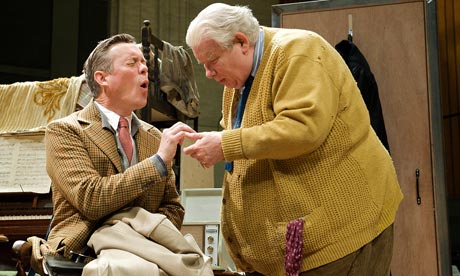A Habit of Art
Do writers tend to write more about themselves as they get older? I guess they do. Art, literature, musical composition is projection; an expression of aspects of the self. This applies to all creative activity; the world seen through the filter of personal experience. It tells us more about the artist than the image.
Alan Bennett’s latest work, The Habit of Art is currently playing at The National. The overworked metaphor of Russian Dolls comes to mind. It is a play within a play. It is about creating a production about the relationship between Wystan (WH) Auden and Benjamin Britten. Set in a rehearsal space, which has been designed to resemble Auden’s grace and favour flat at the Brewhouse in Oxford, where he lived for the last year of his life, it deals with the artifice of creating a play. This explains and fills out a plot that never was, allowing Bennett to explore the chaos of creativity, the competing voices, the author, the absent director, the stage manager who fills in, the biographer, the vanities and fragilities of the actors. Bennett argues that the actors are the foot soldiers; they have to go over the top every night; it’s important they understand their roles. So queries about the text could be put into the mouths of the actors. It’s a clever device; too clever by half, one feels. Maybe Bennett has become unassailable.
Actors bring their own experience to a play. For a few, it’s a job of work, but for most, the role is something they have involved in, to live. Some contemporary directors, Robert Goode, for example, lets the actors determine the way the play turns out. Art, laziness, bad habit?; one senses Bennett has sympathy with this attitude.
So Fitz, exasperated, asks, ‘Why is it all about dicks? Why so little poetry?’ Maybe homosexuality still has the ability to generate tension. But isn’t Bennett exploring his own attitudes to being gay. Doesn’t he identify with Britten, who was always somewhat reticent and ashamed of his homosexuality? Britten was the boy who never grew up; his operas were all on the theme of innocence corrupted, Peter Grimes, Billy Budd, even Death in Venice, but who was being corrupted, was it the Professor or the boy, or was in more a collaboration? Isn’t there something of this in The History Boys and in the relationship between Wystan and Stuart?
Britten’s pleaded for constraint as far as sexuality was concerned. Maybe Bennett feels the same. He feels the abolition of censorship in the theatre takes away the tension of the plot.
Auden was much more open and more cynical; he would pay his rent boys and was very matter of fact about what he wanted them to do. He didn’t seem to care what people thought of him; he just wanted his poetry to be noticed. Both Britten and Auden had lost the meaning of what they were doing; it had become a habit; the habit of art, in much the same way as their sexuality. Neither could deny their art or their nature. Auden became a pedagogue and a bore towards the end of his life. He tended to repeat himself. It was said that you could never tell Wystan anything, just remind him of it. Britten and Pears were notorious for their defensiveness, for cutting people out of their lives. Real artists are not nice people. All their best stuff goes into their art.
Bennett has become a National Treasure. People love his whimsical imaginings, his cosy reminiscences; his diaries, ‘The Lady in the Van, ‘The Uncommon Reader’, ‘The History Boys’. In this bitter sweet play, Bennett brings out his dark side. For all his self deprecation, he has an acerbic wit; he can be bitchy and cutting. There is more than a bit of Wystan in him, as well as Britten. The dark stuff of destruction and corruption is never far away.
The Habit of Art is currently playing at the National Theatre with Richard Griffiths as Fitz playing Auden and Alex Jennings as Henry playing Britten.



